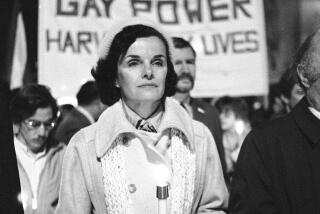Maureen Mansfield; Wife Inspired Former Senate Majority Leader
- Share via
Mike Mansfield, who was the U.S. Senate’s longest-serving majority leader and a champion of landmark civil rights legislation during the 1960s, has been called the greatest living American.
But according to him, such praise might have been better heaped on a woman he met in the late 1920s, when he was a high school dropout with few aspirations beyond the Butte, Mont., copper mine where he worked.
That woman was Maureen Mansfield, his wife of 68 years, who died Wednesday in a Washington nursing home after a long illness.
Throughout Mike Mansfield’s career--from miner to mining engineer, from history professor to Montana congressman, from senator to majority leader and ambassador to Japan under two presidents--he never forgot what she did for him.
“The real credit for whatever standing I have in life should be given to my wife, Maureen,” he said two years ago in a tribute delivered on the Senate floor.
“She encouraged and literally forced a dropout eighth-grader to achieve a university degree and at the same time make up his high school credits. She sold her life insurance . . . to make it possible. . . . What we did, we did together. In short, I am what I am because of her.”
When the Montana Legislature wanted to erect a statue of him in the state Capitol in Helena, he said he’d go along only if she was cast beside him. He insisted not only that her name join his but also that it go first on a research center at the University of Montana.
And unveiled last May outside the Maureen and Mike Mansfield Center on campus was a life-size statue of the popular lawmaker clasping the hand of the stalwart partner he called “my inspiration.”
“The two of them--it’s a wonderful, touching love story. They were inseparable since they married,” said Sen. Max Baucus (D-Mont.). “He always said it was Maureen who made him able to be where he is and do what he’s done, and I know it’s true.”
“No one will ever know how important her advice was to Mike as Montana’s senator and as America’s ambassador to Japan,” said former Rep. Pat Williams (D-Mont.). “But it was considerable, and we all have a debt to Maureen that we don’t truly understand, and can’t.”
Mike Mansfield was the son of Irish immigrants whose father was a New York hotel porter. After his mother died, he was raised by relatives in Montana. At 15, he dropped out of school and went to work in the mines.
When he was 24, he enrolled at the Montana School of Mines. That was when he met Maureen Hayes, the daughter of a Butte coal dealer. Born in Irondale, Wash., she grew up in Butte and attended St. Mary’s College in Indiana. She became a high school teacher, and met Mansfield through her sister, Anne, in the spring of 1928.
Seeing something in him that he perhaps failed to see himself, she talked the miner into finishing his high school education through correspondence courses.
“[She] put some sense into me, told me I ought to go to school and make something of myself,” he once recalled. “It was my wife who really got me started, who pushed me, and thank the Lord she did.”
He left the mines in 1930 and enrolled at the University of Montana at Missoula. Within three years he had both a high high school diploma and a bachelor’s degree. And in 1932, he married Maureen. They had a daughter, Anne, who became a doctor and now lives in England.
The Mansfields both pursued master’s degrees at the University of Montana: hers in English, after writing her thesis on the biographies of Emily Bronte, and his in history.
But Maureen Mansfield also had politics in her bloodline. Her father became a Montana legislator who later ran unsuccessfully for Butte mayor and governor. She encouraged her husband to run for office.
He was elected as a Democratic representative from Montana in 1942, serving five terms before winning a seat in the Senate. He served 16 years as majority leader, shepherding landmark civil rights legislation and President Lyndon B. Johnson’s Great Society programs through Congress. He was an early and fervent critic of the Vietnam War.
After retiring from the Senate, he served 12 years as ambassador to Japan under Presidents Jimmy Carter and Ronald Reagan.
Throughout his long career, Maureen Mansfield stayed in the background, sometimes photographed but rarely quoted. Although her college education was unusual for a woman in the 1920s, she preferred the traditional role and was her husband’s constant companion.
She was with him when he met Chinese leaders Deng Xiaoping and Chou En-lai. When he wrote about those trips, said Pat Murdo of the Mansfield Center at the University of Montana, he mentioned her role.
The Mansfields settled in Washington, D.C., after returning from Japan in 1989. She had been in failing health for some time, Murdo said.
On Mike Mansfield’s birthday two years ago, he was asked by an interviewer what was the best thing about being 95. His reply was touching.
“The nicest thing that happened today was that my wife wrote me a love letter last night, which I picked up this morning when I woke up,” he told the Hill, a Washington publication.
“She made me what I am; she sacrificed so much, did so much, that I can’t even begin to repay her. What a fortunate man I’ve been.”
*
Associated Press contributed to this story.
More to Read
Get the L.A. Times Politics newsletter
Deeply reported insights into legislation, politics and policy from Sacramento, Washington and beyond. In your inbox twice per week.
You may occasionally receive promotional content from the Los Angeles Times.











